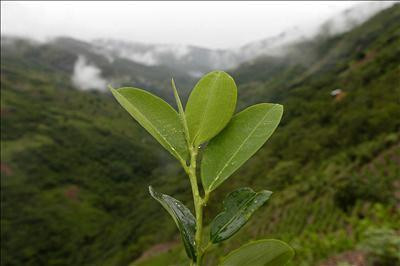Abolishing Coca Leaf Consumption? The INCB needs to perform a reality check
The Transnational Institute condemns the decision by the International Narcotics Control Board (INCB) in their 2007 annual report released today, which calls on countries to ‘abolish or prohibit coca leaf chewing and the manufacture of coca tea’.

The Transnational Institute condemns the decision by the International Narcotics Control Board (INCB) in their 2007 annual report released today, which calls on countries to ‘abolish or prohibit coca leaf chewing and the manufacture of coca tea’. [1]
According to Pien Metaal, researcher specialising in coca issues at the Transnational Institute:
“The Board is displaying both arrogance and blindness by demanding that countries impose criminal sanctions on distribution and possession for traditional uses of the coca leaf, which is a key feature of Andean-Amazon indigenous cultures. Isn’t it time for this UN treaty body to get in touch with reality and show some more cultural sensitivity?”
Coca chewing and drinking of coca tea is carried out daily by millions of people in the Andes as well as considered sacred within indigenous cultures. The INCB’s statement therefore clearly puts it at odds with the UN Declaration on Indigenous Rights approved last year, which promises to uphold and protect indigenous cultural practices.[2] It also contradicts the 1988 convention which recognized traditional uses[3] as well as statements within the current 2007 INCB report which talk about “respect for national sovereignty, for the various constitutional and other fundamental principles of domestic law – practice, judgments and procedures –and for the rich diversity of peoples, cultures, customs and values.” [4]
TNI also condemns the demand within the INCB report that countries should “establish as a criminal offence, when committed intentionally, the possession and purchase of coca leaf for personal consumption”,[5] which if it were implemented would mean the prosecution of several million people in the Andean-Amazon region. It targets not just consumers but also peasants who grow coca: "Governments should establish as criminal offences under its domestic law, when committed intentionally, the cultivation of coca bush for the purpose of the production of narcotic drugs contrary to the provisions of the 1961 Convention",[6] reflecting all uses of the coca leaf.
“Given that the Board in the same report talks about proportionality in sentencing, the Board’s position makes no sense. It would criminalise entire peoples for a popular tradition and custom that has no harm and is even beneficial,” says Pien Metaal.
Earlier reports by the INCB have pointed to the inconsistencies between traditional uses of the coca leaf and the 1961 Single Convention on drugs (which included the coca leaf as “narcotic drug”), but no state has made serious efforts to abolish a habit that has no risk to public health.[7] Moreover, beneficial uses of the plant have growing markets worldwide.
It is understood that the Board was responding to Bolivia’s political decision to give the coca leaf a status as a valuable natural resource, reflected in the new proposed Constitutional text and in its national policy that allows a limited number of farmers to grow a small plot of coca for this traditional use.
According to Martin Jelsma, coordinator of the TNI drugs programme:
“The inclusion of the coca leaf in Schedule I of narcotic drugs of the 1961 Convention was based on an ECOSOC study done back in 1950, inspired by colonial and racist sentiments rather than science. [8] It is time the Board asks the Commission on Narcotic Drugs and the World Health Organisation for guidance on this matter instead of casting its own narrow-minded judgement and retreating to the obsolete thinking of the 1961 Convention.”
Please contact:
Drugs & Democracy Programme (TNI)
Tel +31-20-6626608
Pien Metaal +31-6-40798808 pmetaal@tni.org
Martin Jelsma +31-6-55715893 mjelsma@tni.org
See also: INCB: controversial statements on coca leaf
[1] “The Board calls on the Governments of Bolivia and Peru to consider amending their national legislation so as to abolish or prohibit activities that are contrary to the 1961 Convention, such as coca leaf chewing and the manufacture of mate de coca (coca tea).” Report of the International Narcotics Control Board for 2007, para 217
[2] A/61/L.67, UN Declaration on the Rights of Indigenous Peoples, adopted by the General Assembly on September 13, 2007
[3] 1988 Convention, article 14, paragraph 2
[6] Idem, paragraph 219
[8] The 1950 ECOSOC Commission of Enquiry on the Coca Leaf claimed that the habit of chewing could be held responsible for malnutrition and immoral behaviour of the ‘Andean man’, while reducing his productive capacity. See: Report of the findings of the Commission of Enquiry of the Coca Leaf, ECOSOC 1950.
March 5, 2008
Press release
